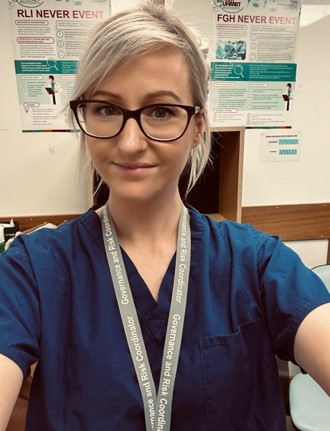 Unsung heroes of the NHS who work in operating theatres across Morecambe Bay are being celebrated as part of Operating Department Practitioners' (ODPs') Day on Tuesday 14 May.
Unsung heroes of the NHS who work in operating theatres across Morecambe Bay are being celebrated as part of Operating Department Practitioners' (ODPs') Day on Tuesday 14 May.
University Hospitals of Morecambe Bay NHS Foundation Trust (UHMBT) is sharing the excellent work of ODPs at its main hospital sites at Westmorland General Hospital in Kendal, Furness General Hospital in Barrow and at the Royal Lancaster Infirmary. The Trust’s ODPs say it is a hugely rewarding job and are sharing why they love being an ODP.
ODPs are some of the first people patients see when they are about to have surgery and when they are in the post-operative recovery period at hospital. ODPs at UHMBT treat patients with great kindness, compassion, care, and professionalism. They work closely with anaesthetists, clinical support workers, surgeons, and nurses before, during and after surgery to ensure that patients receive the highest levels of safe and compassionate care.
Amanda Thomas, Risk and Governance Lead in Theatres at Furness General Hospital (FGH), said: “I love being an Operating Department Practitioner because no two days are the same. One day we could be assisting the anaesthetist, the next assisting the surgeon, and the next day waking you up from your procedure. It requires a unique set of skills bespoke to this profession. It is such an underrated career that isn’t known by many, which is why I love promoting this profession.
“An ODP is often described as a multi-tasking ninja, and this is not wrong. We pre-empt the needs of our team before they even ask for anything. We work in such a fast-paced environment in which the situation could change from second to second. Quite often we work as autonomous practitioners, but ultimately, you’re part of one big theatre family who all share the same goal of giving safe and effective care to our patients, but also support one another when it’s needed most.
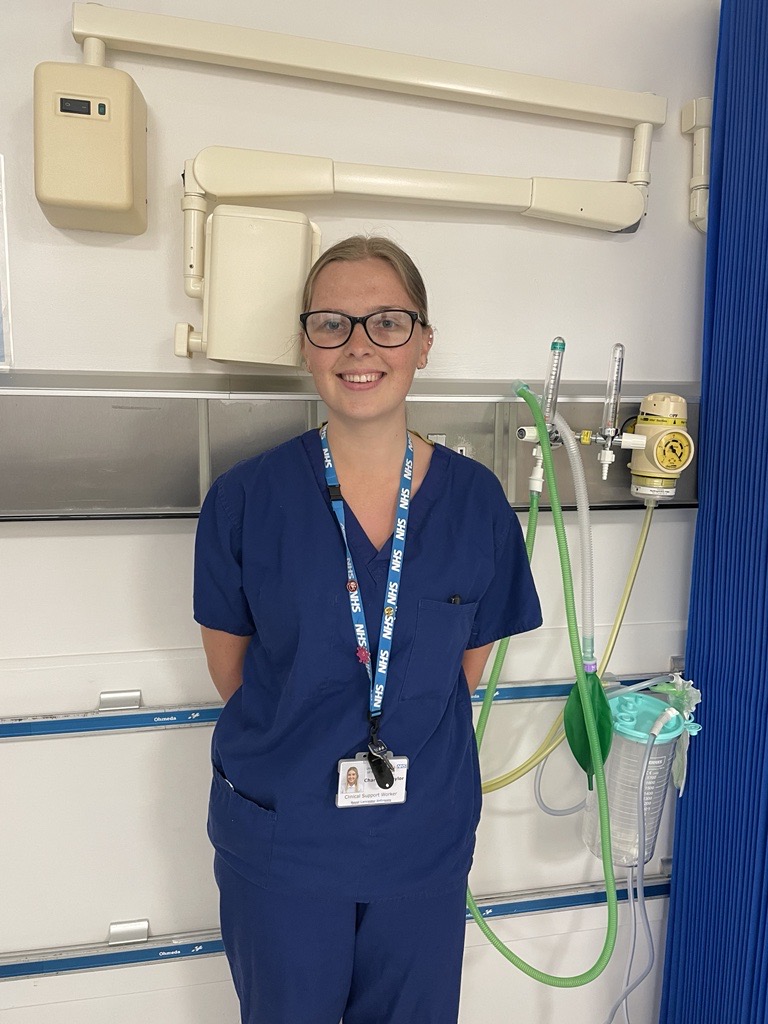 “I feel the skills you acquire throughout your ODP career are priceless. You learn what you are capable of physically and mentally. You will have some days where you leave work with such a big sense of job satisfaction that you made a difference to a patient’s outcome. As an ODP you could progress to being a Practice Educator, Theatre Clinical Lead, Manager, Matron or like myself Risk and Governance Co-Ordinator for Theatre. There are lots of opportunities for additional training such as difficult airway courses, Paediatric Life Support and Advance Life support.
“I feel the skills you acquire throughout your ODP career are priceless. You learn what you are capable of physically and mentally. You will have some days where you leave work with such a big sense of job satisfaction that you made a difference to a patient’s outcome. As an ODP you could progress to being a Practice Educator, Theatre Clinical Lead, Manager, Matron or like myself Risk and Governance Co-Ordinator for Theatre. There are lots of opportunities for additional training such as difficult airway courses, Paediatric Life Support and Advance Life support.
“As ODPs, we are part of a 24/7 service here at FGH with different shifts, on calls and nights. We cover six theatres in our main department and two theatres on South Lakes Birth Centre. We also get called to attend Accident and Emergency and may get called to assist with a cardiac arrest in the hospital. I would recommend this career to anyone not seeking that nine to five routine job – to people who can remain calm in time-critical situations and work well autonomously and within a multi-disciplinary team.”
Charlotte Taylor, an ODP Apprentice at the Royal Lancaster Infirmary (RLI), is loving her apprenticeship: “I love that I am in the theatre department all the time while doing my placements. Outside of my training time, I also work in theatres as a Clinical Support Worker, so the learning feels continual, and I am taking every opportunity to learn. I love the patient interaction, from being with the patient in the anaesthetic room as they are anaesthetised, to seeing them post-operatively waking up in recovery.”
Shelley Baines, an ODP Blood Transfusion and Controlled Drugs Lead for FGH Theatres, said: “I have been an ODP for three years, and love the variety that the job gives you; no two patients or days are the same. I work across anaesthetics, scrubs, and recovery, which means that I get to learn more constantly, and help patients in every way available to us. It is a privilege to assist the surgeons and anaesthetists, and to care for patients at their most vulnerable, advocating for them when they cannot advocate for themselves. It is a truly unique and rewarding career that encompasses the best of working in the NHS, whether it's a small local anaesthetic case to a life-threatening emergency, we are here 24hrs, seven days a week.”
 Michael Thompson, Clinical Service Manager in the Perioperative CBU for UHMBT, said: “I am proud to be an ODP of 51 years’ service - I first joined the NHS in 1973.
Michael Thompson, Clinical Service Manager in the Perioperative CBU for UHMBT, said: “I am proud to be an ODP of 51 years’ service - I first joined the NHS in 1973.
“The role of the ODP offers a lot of variety. When I first embarked on my ODP career, the role was very much restricted to that of anaesthetic technician and was very closely aligned to supporting and working alongside anaesthetists. I spent many years working clinically in theatres and took a great interest in teaching and encouraging the next generation of ODPs, many of whom are still working in our theatres today and I take great pride in that. I have seen some of them rise to very senior roles within the NHS.
“I had a senior clinical role within theatres and ultimately managed the Trust-wide Theatre services for a number of years and for a while moved into a Divisional Management role prior to flexible retirement. Even now in semi-retirement, I find it hard to let go of the Theatre services and I know many colleagues who enjoy their work so much and are so invested in it, that giving it up is a difficult decision. Working as an ODP is a career that offers many opportunities both clinically and managerially. It is rewarding, you leave each day with a sense of satisfaction that the day went well and all patients were safely cared for. There are not many roles in life where you can say that!”
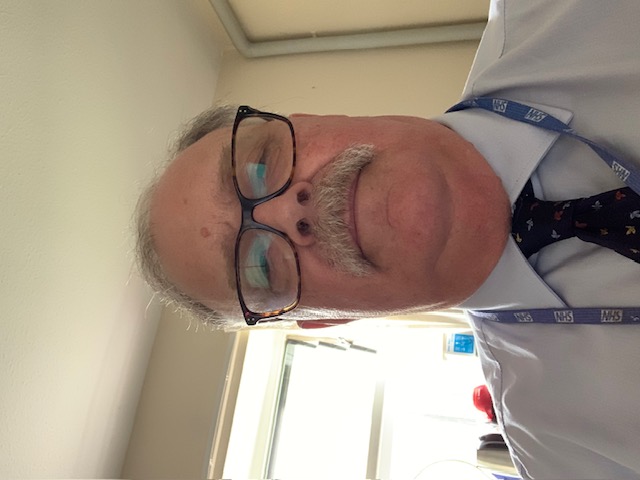 Sandra Frazer, an ODP Apprentice in Theatres at Westmorland General Hospital (WGH) in Kendal, said: “I have just started my ODP journey as an ODP Apprentice through the Trust and I really do wish I had done it earlier. The skills I have gained in just a year are so valuable.
Sandra Frazer, an ODP Apprentice in Theatres at Westmorland General Hospital (WGH) in Kendal, said: “I have just started my ODP journey as an ODP Apprentice through the Trust and I really do wish I had done it earlier. The skills I have gained in just a year are so valuable.
“I love dealing with patients, and as an ODP I feel you have three chances to make that impact. From the anaesthetic room where you reassure the patient while they go to sleep, or talking to them if they are under a local anaesthetic. In theatre even though patients might be anaesthetised, you are their advocate so making sure everything you do is for the benefit of the patient. In recovery you are there to make sure the patient can maintain their own airway and manage their pain and once again be a friendly face and reassurance that everything went well. My training both at university and on my placement has been supportive, informative, pushing me to learn, and everyone that I have worked with has been instrumental in me succeeding in this course. I am proud to able to say that in two years' time I will be qualified and be offering that help to patients all the time.”
Deena Akister-Benson, an ODP at FGH, said: “I absolutely love being an ODP because every day is different, and you get to put your full care and attention on one patient at a time. I currently work in anaesthetics and recovery. Being that first person that they meet when they come to theatre has a massive impact on the patient’s overall experience in theatre. Within that first five minutes of meeting that patient you need to gain their trust; they are in a very vulnerable situation, and you are the person that is going to be their advocate for them while they have their operation.
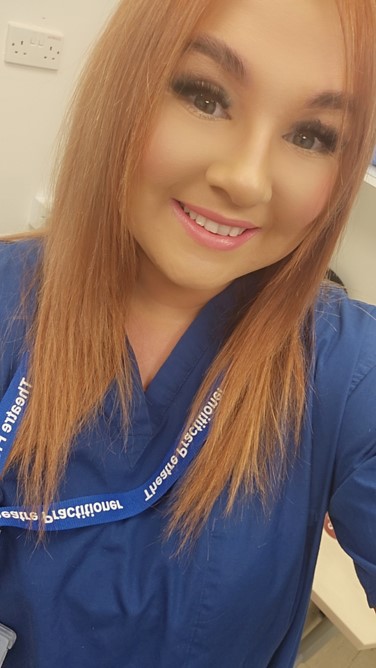 “Being an ODP is a very rewarding job you make a massive impact on that patient's life, and you are helping people get better. Being part of an amazing and supportive ‘theatre family’ makes challenging situations easier to deal with due to the massive support you get from all your colleagues it really is like a massive family. Everyone is so friendly and caring which makes your job that little bit more enjoyable. I have made friends for life working in FGH theatres.
“Being an ODP is a very rewarding job you make a massive impact on that patient's life, and you are helping people get better. Being part of an amazing and supportive ‘theatre family’ makes challenging situations easier to deal with due to the massive support you get from all your colleagues it really is like a massive family. Everyone is so friendly and caring which makes your job that little bit more enjoyable. I have made friends for life working in FGH theatres.
“You get to help people undergo lifesaving surgery to surgery that is going to help them in their day-to-day life. You get to hold people's hand when they are anxious and scared, you also get to be there and support them when they are bringing a baby into the world. That is one of my favourite aspects of being a ODP and still brings a tear to my eye after nine years. There is so much to this job and there are different ways to progress. I absolutely love my job and would recommend anyone to come down and see what we do here in theatre for a day - you would really see we are the unseen heroes of the NHS.”
Carly Simpson, Clinical Theatre Manager at the RLI, said: “I’m immensely proud to be an ODP. I love the teamwork in theatres and being able to look after one patient at a time, focusing all my attention on them. Being an ODP and coming to theatres every day is routine to ODPs, but to patients it is a big deal. It is a privilege to be able to look after each patient to a high standard and make their experience as good as possible.”
Lindsey Cannon, an ODP Clinical Leader in theatres at the RLI, said: “I am proud of my career as an ODP. No day is the same and I can use my skills in all areas of theatres. Being a lead for students coming into theatres gives me a chance to help pave their career path of excellent patient care. For other students coming into theatres, such as nurses, paramedics and physios, they leave knowing what ODPs do as a profession.”
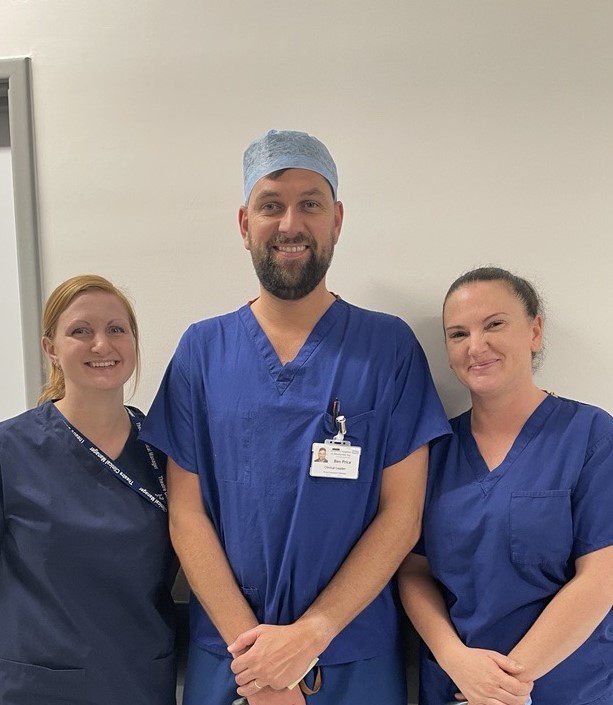 Danny Bakey, Transformational Lead for Theatres at UHMBT, said: “As someone who trained and initially worked as an ODP, I am incredibly proud of all the ODPs working within our Trust.
Danny Bakey, Transformational Lead for Theatres at UHMBT, said: “As someone who trained and initially worked as an ODP, I am incredibly proud of all the ODPs working within our Trust.
“Our ODPs perform a crucial role in our surgical teams and are constantly going above and beyond the call of duty for our patients. They care for patients at some of the most vulnerable times in their lives and I witness their compassion on a daily basis.
"I am delighted that we are celebrating the work of our ODPs as the whole country is celebrating ODPs Day. It is a massively rewarding profession and I’d recommend it to anyone.”
You can follow National ODP Day on Twitter at #ODPday
END

